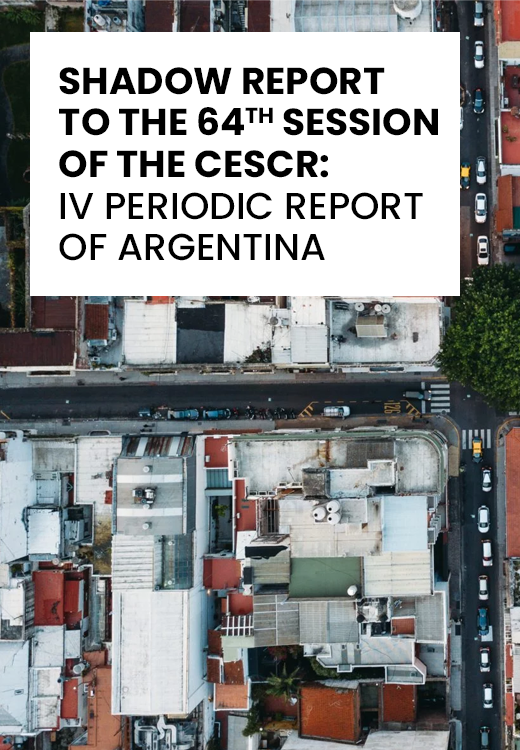The 64th Session of the Committee on Economic, Social and Cultural Rights (CESCR) is considering the State report of Argentina. DAWN has collaborated with the Centro de Estudios Legales y Sociales (CELS) and other civil society organisations to prepare a joint shadow report. Flora Partenio, Executive Committee member, is attending the CESCR session in Geneva.
DAWN also contributed with the elaboration of a report about access to abortion in Argentina: Joint Report_Abortion CESCR-eng
Haz click aquí para ir a la versión en español.
Alternative Report for Committee on ESCR
IV PERIODIC REPORT OF ARGENTINA
Centro de Estudios Legales y Sociales (CELS), Asociación Civil por la Igualdad y la Justicia (ACIJ), Fundación Germán Abdala, Development Alternatives with Women for a New Era (DAWN)
INTRODUCTION

In Argentina, significant structural limitations persist in terms of access and effective exercise of economic, social and cultural rights of most of its population. In the past years, these limitations reinforced due to the combination of political and economic measures that led to a transfer of income to sectors where capital is concentrated, a trend to reprimarization of the productive system[1] and an accelerated process of public indebtedness[2]. Since 2016, a series of measures have had a negative impact, affecting particularly low-income populations and they consisted mainly in: cuts on funds for housing policies[3], adjustment of retirement pensions and restrictions on some social protection programs.
Besides, the policy of subsidy cuts affecting gas, electricity and transportation service providers led to a widespread increase of tariffs for residential users. On a cumulative basis and depending on the region, utility tariffs have increased between 200% and 1000% since 2016.
This was already an extremely adverse scenario for the exercise of economic, social and cultural rights. However, this was increasingly aggravated by the political and economic impact of the critical macroeconomic situation in Argentina marked by an internal economic downturn, a decline in labor and social indicators, high inflation (an estimated annual inflation rate of more than 40% in 2018) and the fast decrease in the purchasing power of salaries and fixed income, accelerated by subsequent devaluations of the Argentine peso.
In April 2018, Argentina was shaken by the turmoil of the currency crisis that left a more than 100% devaluation of the national currency against the United States dollar. The government resorted to the International Monetary Fund that granted a 50-billion-dollar loan to Argentina within the framework of the “Memorandum of Technical Understanding”[4] whereby the Argentine government commits to go ahead with a strict fiscal adjustment focused on a reduction of public spending. The announcement did not restore market confidence in Argentina nor contributed to stabilize the value of the peso. By the end of August, after new “financial runs” and accelerated devaluation, the agreement between IMF and the government was adjusted, committing to further fiscal adjustments: the government requested an early release of funds and committed to make further adjustments to bring the fiscal deficit to zero in 2019.
According to the text of the Memorandum, for the fulfillment of this goal, the government will increase subsidy cuts on energy and transportation, downsizing the public sector and suspending public works. The current fiscal deficit in the provinces, of 0.46% of GDP, must turn into a surplus equivalent to 0.25% of GDP in 2022[5]. Considering the tax structure of Argentina and the limited income-generation capacity of subnational governments, fiscal targets will only be achieved by the strict adjustment of public spending with an impact on two basic social services with decentralized execution: education and health.
The government introduced a transitory tax on exports of primary products until 2020, presented by President Macri calling on those who earn more to contribute with more: “We are asking those in better conditions to contribute, that is to say, those who export in Argentina, will have to make a higher contribution.” However, considering that the tax introduced is transitory, fixed and in pesos, the export sector may even have wider profit margins, in a context where greater devaluation is expected, distorting the spirit in which the tax was announced. There is also a risk of tax withholding without trading the exportable production, until the deadline is met, in 2020.
In an austerity push, the government restructured the national cabinet, whereby ministries that implement public policies of great impact in terms of economic, social and cultural rights, remained as secretaries: Environment and Sustainable Development; Energy, Tourism, Work, Agroindustry, Health, Culture and Science and Technology are currently secretaries of state.[6]
The Memorandum considers the possibility of incurring in additional expenses to protect the most vulnerable sectors. Since adjustments increased under the “zero deficit” slogan, the government announced that social allowance beneficiaries will receive bonuses in September and December. These specific measures are announced amid a context of widespread agreement, among all sectors, on the fact that crisis and adjustment have an impact on the rights of people from popular sectors and this situation is getting worse by the minute.
Growing social unrest, caused by worse social and labor conditions, has been addressed by the State, at different levels and forms, using repression, criminalization and intimidation. These measures have a disciplinary impact and slash the rights linked to social protest and public demonstration.
Apart from the issues mentioned in this introduction, this report also addresses other issues such as access to public information and rights related to how the judiciary works, among others. It is part of a series of thematic reports that all together complement the review and analysis of the situation of the cultural, social and economic rights in Argentina. Together with this document and in partnership with different partners and organizations, CELS also presents reports related to the situation of migrants and peasants, users of mental health services, the right to work, cultural property and the situation of the right to abortion in Argentina.
In this document, each section poses questions and recommendations as contributions to the evaluation process and to be considered by the Committee during the forthcoming evaluation hearing within the framework of the 64th session as well as during the release of its Concluding Observations on Argentina.
[1] Para más información ver “El impacto negativo de las políticas económicas en la vigencia de los derechos económicos y sociales” en Derechos Humanos en Argentina, informe 2017, disponible en: https://www.cels.org.ar/web/publicaciones/derechos-humanos-en-la-argentina-informe-2017/
[2] Desde diciembre de 2015 la deuda externa argentina aumentó un 142%.
[3] La asignación de recursos presupuestarios ha disminuido sensiblemente en materia de políticas estatales de vivienda y hábitat, un área clave para contrarrestar la desigualdad social y territorial en un país con históricos déficit de infraestructura. La participación del gasto público sobre el presupuesto total en vivienda y urbanismo se redujo un 50% entre 2015 y 2016.
[4] Disponible en: https://www.argentina.gob.ar/noticias/carta-de-intencion-memorandum-de-politicas-economicas-y-financieras-y-memorandum-de
[5] Claudio Lozano y Mariana Rivolta (coordinadores), “La situación de las provincias frente al ajuste del FMI”, Instituto de Pensamiento y Políticas Públicas, 10 de agosto de 2018.
[6] Ver decreto 801/2018, disponible en: http://servicios.infoleg.gob.ar/infolegInternet/anexos/310000-314999/314078/norma.htm
Download the full shadow report here: Alternative Report CESCR_Argentina

